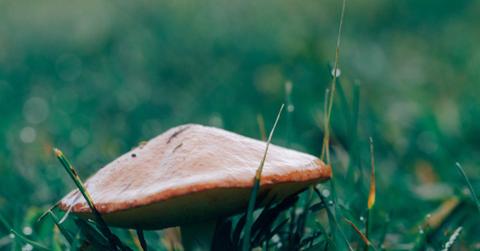Healthiest Way To Cook Mushrooms? In A Microwave, Study Says
Many of us have heard the rumor that microwaving food zaps the nutrition right out of it. But according to recent research, using the microwave to prepare certain foods, like mushrooms, might actually preserve the vitamins we desire.
Updated May 23 2019, 8:01 a.m. ET

Forget what you heard about microwaves zapping nutrition out of your meals. A new study shows they’re actually key to keeping certain foods, like mushrooms, nutritionally viable, the Telegraph reports. In general, fungi are nutritional powerhouses. They’re great sources of protein, essential amino acids, and vitamins B1, B2, B12, C, D and E. Mushrooms are also great sources of zinc, selenium, and biologically active compounds like betaglucans (great for heart health) as well as minerals such as zinc and selenium. But that doesn’t do you a whole lot of good if the way you cook your mushrooms is zapping them of all their health benefits.
For the study, which was published in the International Journal of Food Sciences, scientists at the Mushroom Technological Research Center at La Rioja, Spain, tested four kinds of mushrooms: king oyster, oyster, shiitake, and white button. They checked the antioxidant activity when the mushrooms were raw and cooked in various ways.
Boiled mushrooms showed higher glucans content but significantly lowered antioxidant levels, with boiling and frying negatively affecting nutritional content because of leaching.
"Frying and boiling treatments produced more severe losses in proteins and antioxidants compounds, probably due to the leaching of soluble substances in the water or in the oil,” said Irene Roncero, the study’s author. She concluded that these methods of heating food “may significantly influence the nutritional value of the final product,” most noticeably in levels of ash, carbs, and proteins while increasing fat and energy amounts.
Meanwhile, microwaving and grilling mushrooms caused marked increases in polyphenol and antioxidant activity—and Roncero noted “no significant losses in nutritional value of the cooked mushrooms."
But what of all the rumors we’ve heard that the radiation in microwaves destroys the nutritional value of food?
Not so fast, according to separate research that’s been done over the last decade. The truth is that most cooking methods reduce some nutritional value. How long something cooks for and how, as well as with how much liquid and at what temperature, will largely dictate how many vitamins and minerals are lost.
Because microwave ovens generally require lower temperatures and less time to cook, they actually do the least damage to heat-sensitive, water-soluble vitamins like vitamin B, vitamin C, and folic acid—all common nutrients in vegetables.
Scientists at Cornell University found microwaved spinach kept virtually all folate when microwaved; but lost 77 percent of it on a stovetop. But back to the mushrooms. In addition to retaining their nutritional benefits during grilling or microwaving, adding a small amount of oil to mushrooms while they were being grilled caused no nutrient loss due to leaching. In fact, olive oil actually proved to raise the fungus’ antioxidant capacity.
Ms. Roncero’s conclusion? "The adequate selection of the culinary method is a key factor to preserve the nutritional profile of this highly consumed food."